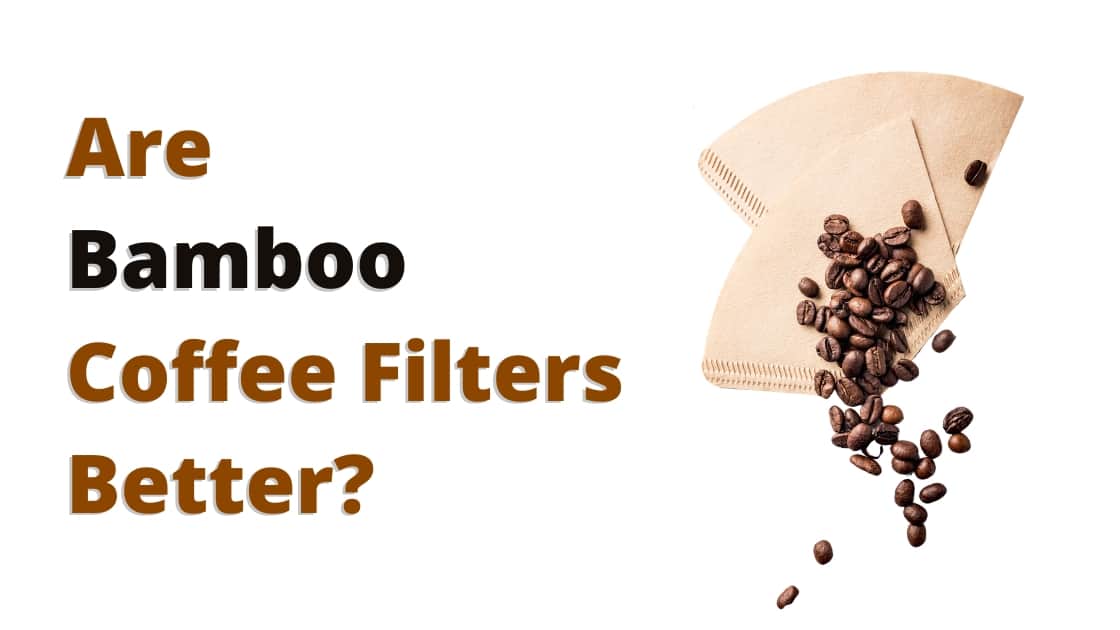If you regularly brew your own coffee, you may have wondered what makes bamboo coffee filters different from other paper filters or from permanent coffee filters. Are there any advantages to bamboo coffee filters that make them a better choice?
Bamboo coffee filters don’t offer a different tasting brew compared to other quality paper filters, but bamboo filters are more environmentally friendly since bamboo is a self-sustaining natural resource. Paper filters offer a brighter, fruitier brew.
Not all paper filters produce the same brew of coffee. Some paper filters are made with lesser quality materials that result in an inferior brew, so it is important to consider your choices if you want to make the most of your coffee experience.
Cheap coffee filters may burst, resulting in a messy clean-up and a gritty brew of coffee, or they may be treated in ways that impart undesired flavors to the coffee. If you choose a quality paper filter, however, there is usually no transference of flavors and a simple, efficient clean-up.
Bamboo has been gaining popularity due to the fact that bamboo continually grows at an amazingly fast rate. This means that the bamboo harvested to create a filter will grow back quickly and be used again and again without depleting the resource. As such, bamboo can be a more appealing option rather than traditional paper filters that rely on slow-growth forests to provide the paper.
There truly are many advantages to using paper filters, in general, but especially bamboo coffee filters. If you want to enjoy the best brew of coffee, read on to find out how the choice of a filter can make an impact on the quality of your cup of coffee.
Why Should I Use Paper Coffee Filters Such As Bamboo Coffee Filters?
Paper coffee filters offer a number of benefits when compared to permanent filters. First of all, paper filters make cleaning up after brewing coffee very easy. With paper filters, the spent coffee grounds are simply picked up and thrown away. Permanent filters require thorough washing between every use.
The fact that paper filters are disposable also makes them potentially more sanitary than a permanent filter. Permanent filters are used repeatedly and over time, even with regular cleaning, they will inevitably accumulate build-up which can affect the cleanliness and the taste of the coffee. Paper filters, on the other hand, are only used once and are thus more hygienic, without the risk of accumulating build-up over time.
Paper filters also can provide a better-tasting brew of coffee. Many permanent filters are unable to accommodate finer grinds of coffee. When coffee is ground more finely, the resulting brew tends to be more rich and robust in flavor. Paper filters also are better at trapping the small, bitter particulates that can spoil the flavor of a brew by imparting bitterness. Many coffee drinkers prefer the lighter, brighter taste of paper filtered coffee.
Paper coffee filters may also have health benefits associated with their use. Some studies have indicated that not using paper filters will have a negative effect on your cholesterol levels. If you routinely drink coffee, using a paper filter can be healthier for you in the long run.
Finally, paper coffee filters are also generally more environmentally friendly. Many paper filters are made of recycled materials and are biodegradable. Permanent filters are not biodegradable and while it may seem to produce less waste since it is reusable it still creates an environmental impact since it is unable to be recycled when it eventually is no longer usable.
Are Brown or White Coffee Filters Better?
There is generally no difference between quality white paper coffee filters and brown coffee filters. In its natural form, paper is a brown color. All wood pulp that is used to create paper, whether it be for coffee filters, computer paper, or magazine pages, all starts out with a brown color.
In order to look more appealing, most paper is processed in order to give it a clean, white color. This processing can involve extensive chemical processing, including treating the paper with bleaching chemicals. Because of this, some white paper coffee filters may not be desirable due to the use of chemicals in the production process.
Considering this, bleached coffee filters are still considered perfectly safe to use and there is no effect on the coffee’s taste. There are two main methods of bleaching coffee filters: oxygen bleach or chlorine bleach. Oxygen bleaching is considered to be a more natural process and usually indicates a higher-quality coffee filter. If you want to have a less processed coffee filter but prefer the white paper filters, look for filters that do not use chlorine bleaching.
Brown coffee filters are therefore unbleached and less processed than white filters. The resulting brew of coffee tastes no different than when using a quality white coffee filter, but brown coffee filters have less of an environmental impact. Since brown coffee filters do not require extensive chemical treatment, they are more environmentally friendly. Some brown filters will need to be wetted before brewing coffee, in order to rinse away undesired papery flavors.
As long as you are choosing quality filters, the choice of a brown coffee filter or a white coffee filter usually simply comes down to aesthetic preference.
Do Coffee Filters Change The Taste Of Coffee?
The choice of coffee filter type can make subtle differences in how your pot of coffee tastes. One of the main differences in taste simply comes from the differences in the straining capabilities of different types of filters.
Most metal reusable filters are not fine enough to filter out the smallest components of coffee. This means that oils and very small particulates can pass through the filter and into your brew. The oils can impart the brew with significantly more flavor, but at the cost of potentially raising cholesterol. These oils can also oxidize while you drink the coffee, meaning the taste of the brew may alter as time passes.
When finer grounds and particulates are able to enter the coffee brew, it generally makes for a cloudier, more robust brew. The sediment itself may be bitter if consumed, but it increases the strength of the brew. Paper filters keep these fine grounds from reaching the brew, and the resulting pot of coffee is usually brighter and lighter.
Some coffee fanatics describe coffee brewed with paper filters as more sweet and fruity. If you like a lighter, less intense brew of coffee, a paper filter may be a better choice. Paper filters are also a better choice if you are worried about excessive amounts of sediment accumulating in your cup.
Being able to use coffee that is more finely ground tends to impart more flavor to the brew, since finer particles have more surface area which comes in contact with the water and allows for more oils and flavors to seep into the water. In this sense, a filter that allows you to use a finer grind of coffee may result in more flavorful brews.
Are Paper Coffee Filters Healthier?
A recent topic of scientific debate has been whether paper coffee filters are healthier than permanent metal coffee filters. There are arguments for and against both filter types.
Paper filters have received some negative attention due to the fact that bleached white coffee filters may potentially leach dioxin into the coffee brew. Dioxin is a byproduct of the chemical bleaching process and it is hazardous to consume. While it is rare for it to leach from paper filters and the levels are usually minuscule, it is still worth consideration.
Metal coffee filters, however, have been shown to have a negative influence on cholesterol levels. Coffee contains oily substances known as diterpenes, which have been shown to have a detrimental health effect. Paper filters help effectively strain these oily substrates out of the coffee, which means that cholesterol LDL levels are less affected by coffee brewed with paper filters.
The studies that demonstrated paper coffee filters were better at filtering out the diterpenes also made note that cholesterol levels were only negatively affected in those drinking five to eight cups a day. If you are only enjoying a cup or two each day, there may be no remarkable cholesterol difference between using a metal coffee filter or a paper coffee filter.
Is It Cheaper To Use a Reusable Coffee Filter Rather Than Paper Filters?
Over time, the cost of using paper filters can add up. This can be even more evident if you brew multiple times per day. Reusable metal filters generally have a more expensive initial cost, but depending on how frequently you drink coffee it may be the most cost-effective brewing strategy.
Reusable metal coffee filters can last up to seven years and cost anywhere from $5 to $60 (£4 to £50). If you consider using one of the more expensive filters costing £50 and you assume it lasts five years you will have a per year cost of £10 over the lifetime of the filter.
By comparison, paper coffee filters may seem cheaper initially because they generally cost only a few cents each. Paper filters are single-use, however, so if you brew several times a day you may use several filters. Even if you assume a filter costs £0.04 each and you brew a single cup of coffee each day, the yearly cost of paper filters will be £16. Over time, this can really add up compared to a reusable filter.
Overall, depending on your coffee consumption rate, using a paper filter may not be the cheapest option. However, the convenience and ease of using paper filters and the ability to choose environmentally friendly options may make the extra cost worth it.

